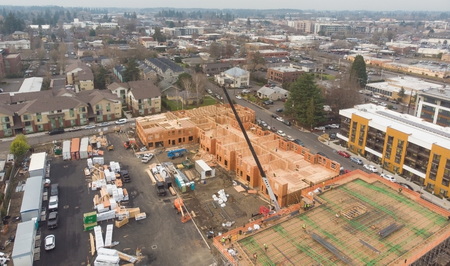 Proposed changes to the taxation of carried interest were cut from Senate Democrats’ broad Inflation Reduction Act (IRA) yesterday at the request of centrist Sen. Kyrsten Sinema (D-AZ). The Roundtable and 14 other national real estate organizations wrote to all members of Congress on Aug. 3 in strong opposition to the measure. (Coalition letter, Aug. 3 | Wall Street Journal, Aug. 4 |Tax Notes, Aug. 5). Photo above: Sen. Sinema at The Roundtable's 2022 Spring Meeting.
Proposed changes to the taxation of carried interest were cut from Senate Democrats’ broad Inflation Reduction Act (IRA) yesterday at the request of centrist Sen. Kyrsten Sinema (D-AZ). The Roundtable and 14 other national real estate organizations wrote to all members of Congress on Aug. 3 in strong opposition to the measure. (Coalition letter, Aug. 3 | Wall Street Journal, Aug. 4 |Tax Notes, Aug. 5). Photo above: Sen. Sinema at The Roundtable's 2022 Spring Meeting.
Vote on Revised Reconciliation Bill
- Sinema announced her decision in a statement released Thursday night, commenting she would “move forward” with the $790 billion reconciliation bill after removal of the carried interest provision—subject to the Senate Parliamentarian’s review of the revised bill.
- Yesterday, Senate Majority Leader Chuck Schumer (D-NY) announced that the chamber will begin consideration of the bill on Aug. 6, setting up a weekend process of around-the-clock votes on hundreds of amendments to the bill.
- Real Estate Roundtable President and CEO Jeffrey DeBoer commented today, “The wide-ranging climate measures in the revised bill include the most extensive clean energy investments ever considered by Congress—a positive step welcomed by the real estate industry. We are also pleased to see that carried interest provisions in the original version of the Inflation Reduction Act are out, since they would have clearly harmed the residential and commercial real estate industries, job creation and the economy.”
Real Estate’s Carried Interest Opposition

- The real estate coalition urged policymakers to preserve current carried interest law and detailed major concerns with the proposed changes to carried interest that were in the original IRA, brokered last week between Sens. Schumer and Joe Manchin (D-WV). (Coalition letter, Aug. 3 and Roundtable Weekly, July 29)
- The Aug. 3 coalition letter noted, “The carried interest proposal would slow housing production, discourage the capital needed to reimagine buildings to meet post-pandemic business needs, hamper job creation and create an additional unknown in an already confusing economic environment.”
- The real estate coalition letter concluded, “Now is not the time to impose a tax increase on the countless Americans who use partnerships to develop, own, and operate housing and other commercial real estate. We urge you to preserve current tax law as it relates to carried interest.”
Senate Considers Changes

- Senate Democrats are making additional changes to the package, including adjusting the minimum tax on corporations and adding a 1% excise tax on stock buybacks. (New York Times, Aug. 4 and Punchbowl News, Aug. 5)
- Before a final Senate vote can be held, the Senate Parliamentarian must ensure the bill complies with special budget reconciliation rules, which require provisions directly relate to spending and revenue—not policy.
- One hurdle before the Parliamentarian is a clean energy tax credit that proposes a bonus incentive to developers who pay prevailing wages on certain projects. If it is determined to be a policy change, it will be dropped from the bill. (POLITICO Power Switch, Aug. 3)
- A number of the IRA’s proposed revisions to the federal tax code could leverage greater private sector investments in clean energy building technologies, including:
- A deduction to help make commercial and multifamily buildings more energy efficient (Section 179D),
- A credit to encourage investments in renewable energy generation and other low carbon equipment such as solar panels, energy storage, and combined heat and power systems (Section 48), and
- A credit to incentivize installations of EV charging stations (Section 30C).
The Roundtable continues to work with its policy advisory committees and national real estate organization partners to assess how details in the bill language could impact CRE. These policies will be a focus of discussion during The Roundtable’s Sept. 20-21 Fall Meeting in Washington, DC.
# # #
 Proposed changes to the taxation of carried interest were cut from Senate Democrats’ broad Inflation Reduction Act (IRA) yesterday at the request of centrist Sen. Kyrsten Sinema (D-AZ). The Roundtable and 14 other national real estate organizations wrote to all members of Congress on Aug. 3 in strong opposition to the measure. (Coalition letter, Aug. 3 | Wall Street Journal, Aug. 4 |Tax Notes, Aug. 5). Photo above: Sen. Sinema at The Roundtable's 2022 Spring Meeting.
Proposed changes to the taxation of carried interest were cut from Senate Democrats’ broad Inflation Reduction Act (IRA) yesterday at the request of centrist Sen. Kyrsten Sinema (D-AZ). The Roundtable and 14 other national real estate organizations wrote to all members of Congress on Aug. 3 in strong opposition to the measure. (Coalition letter, Aug. 3 | Wall Street Journal, Aug. 4 |Tax Notes, Aug. 5). Photo above: Sen. Sinema at The Roundtable's 2022 Spring Meeting.
